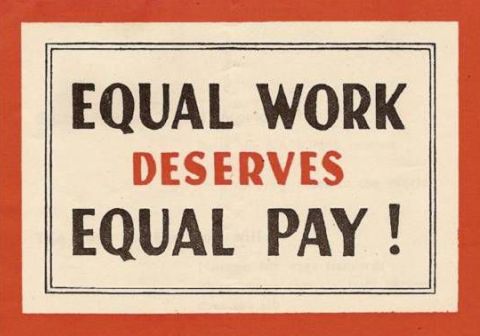Human beings expect to receive equal pay for equal work. Any perceived inequality in pay by an aggrieved party will often lead to protest in some form or other. This attitude towards equal pay is best exemplified by the workers in the “Parable of the Workers in the Vineyard” (Matt.20: 1-16):
“For the kingdom of heaven is like a landowner who went out early in the morning to hire men to work in his vineyard. He agreed to pay them a denarius for the day and sent them into his vineyard. “About the third hour he went out and saw others standing in the marketplace doing nothing. He told them, ‘You also go and work in my vineyard, and I will pay you whatever is right.’ So they went. “He went out again about the sixth hour and the ninth hour and did the same thing. About the eleventh hour he went out and found still others standing around. He asked them, ‘Why have you been standing here all day long doing nothing?’ ” ‘Because no one has hired us,’ they answered. “He said to them, ‘You also go and work in my vineyard.’
“When evening came, the owner of the vineyard said to his foreman, ‘Call the workers and pay them their wages, beginning with the last ones hired and going on to the first.’
“The workers who were hired about the eleventh hour came and each received a denarius. So when those came who were hired first, they expected to receive more. But each one of them also received a denarius. When they received it, they began to grumble against the landowner. ‘These men who were hired last worked only one hour,’ they said, ‘and you have made them equal to us who have borne the burden of the work and the heat of the day.’ “But he answered one of them, ‘Friend, I am not being unfair to you. Didn’t you agree to work for a denarius? Take your pay and go. I want to give the man who was hired last the same as I gave you. Don’t I have the right to do what I want with my own money? Or are you envious because I am generous?’ “So the last will be first, and the first will be last.”
This expectation of equal pay is harboured by monkeys, dogs, birds, chimpanzees and other animals as demonstrated by Frans de Waal, a primatologist and Emory University professor. Mr de Waal first conducted an experiment with Capuchin monkeys close to a decade ago but performed it again recently and videotaped the results.
In the hilarious video, two Capuchin monkeys are kept in side-by-side cages. Each monkey is given the same task to complete: handing the experimenter a rock. Their “pay” is a slice of cucumber. The first time a monkey completes the required task he is recompensed with a small chunk of cucumber and eats it without a kerfuffle. But when the experimenter starts paying one of the monkeys in grapes (which the monkeys like better than cucumbers and is obviously regarded as a better pay), the monkey who was being paid in cucumbers goes bananas and protests over the unequal pay. He ditches his second chunk of cucumber at the scientist then pounds the table and rattles the walls of his cage in protest of the pay disparity.
The hilarious ‘Fairness Study’ was uploaded to YouTube in May and has since gone viral, garnering more than 1.4 million views.
Mr de Waal said if both monkeys get cucumber as a reward they are happy to repeat the task up to 25 times.
‘But if you give one grapes, which is a far better food, then you create inequity between them,’ Mr de Waal said.
‘So, this is basically the Wall Street protest that you see here,’ he added, referring to the Occupy Wall Street movement.
Mr de Waal and his colleague, Sarah Brosnan, published their findings in the journal Nature in 2003. He said the study has now been repeated with dogs, birds and chimpanzees.
Interesting! Enjoy the video now:
 CY@CY Says Welcome to my dreamscape. Where a Lim is also a Ling.
CY@CY Says Welcome to my dreamscape. Where a Lim is also a Ling.

